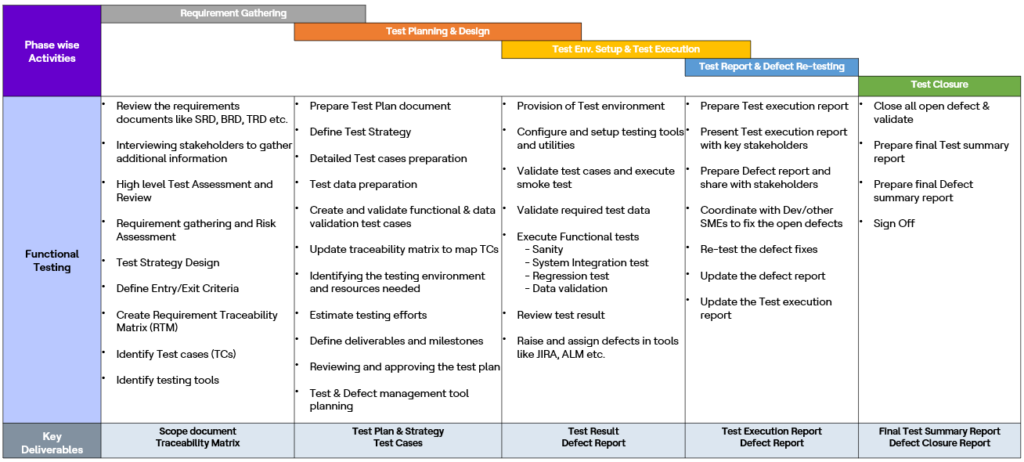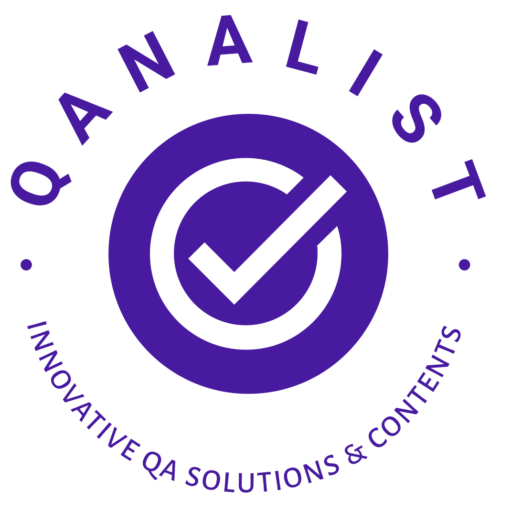Software testing is a process, to evaluate the functionality of a software application with an intent to find whether the developed software met the specified requirements or not and to identify the defects to ensure that the product is defect free in order to produce the quality product. There are two different types of software testing as below:
- Functionality Testing
- Non-functionality Testing
Functional Testing
Functional testing is a type of testing which verifies that each functionality of the software application, whether the function is working according to the requirement specification. Functional testing is also called as Black box testing, since it focuses on application specification/ business flows, but not concerned about the source code of the application.
Every functionality of the system is tested by providing appropriate input, verifying the output and comparing the actual results with the expected results. This testing involves checking of User Interface, APIs, Database, Security, Client/ Server applications and functionality of the Application Under Test. Functional testing can be done either manually or using automation.
Functionality validation can be performed in two popular techniques:
- Requirements based: Containing all the system/ application’s functional specifications which form a basis for all the tests to be performed.
- Business scenarios based: Containing the information about how the system/ application will be achieved from a business process perspective.
Testing is the important phase of the SDLC process. Tester/QA Engineer needs to be aware of various types of testing activities even if they are not directly involved with them daily.
Purpose of Functional Testing
Functional testing is performed to validate that each function of the application works in conformance with the requirement and specification. The purpose of the functional testing is to validate the primary entry function, necessarily usable function, the flow of GUI screens. Functional testing displays the error message so that the user can easily navigate throughout the application.
- Validate each function of the application: Each functionalities of the application will be tested by providing the appropriate input and validating the output against the functional requirements of the application.
- Verify primary entry function: Each entry function of the application will be tested to check all the entry and exit points.
- Business flow of the GUI screen: Business flows of the GUI screen is validated, so that the user can navigate throughout the application.
How to do Functional Testing?
Each type of software testing follows the standard phase wise process which is called Software Testing Life Cycle (STLC). Functional testing will also follow the STLC process to validate any application wr.to find out any defects in the system.
STLC is a systematic approach to test a software application and ensuring that it meets the business requirements and is free of defects. The STLC focus to ensure that the application is of high quality, reliable, and meets the needs of the end-users as well as business. STLC follows a series of phases, and each phase has specific objectives and deliverables. The main objective of the STLC is to identify and document any bug/ defects or issues in the software application as early as possible in the development process.
The phases of the STLC include Requirement Gathering, Test Planning, Test Design, Test Environment Setup, Test Execution, Test Reporting, & Defect Retesting and Test Closure. Each phase includes specific activities and deliverables that help to ensure that the software application is thoroughly tested and meets the business requirements of the end users.
Functional Testing in Software Testing Life Cycle (STLC)

Benefits of Functional Testing
Functional testing is performed from the user’s perspective and validate the system behavior that users are interested in. Some of the key benefits are called here for functional testing:
- To Meet business requirements: Functional testing is done to ensure the software application meets the specified functional requirements.
- Defect detection: By executing various test scenarios, functional testing identify issues related to data processing, user interactions, calculations, and others. Detecting and addressing these defects early in the SDLC that save time and costs.
- Increase User satisfaction: Functional testing validate that the software/application functions correctly from the end-user’s perspective. It focus to ensures a positive user experience, meeting user expectations and increasing satisfaction.
- Improved software quality: By thoroughly checking the application’s functionality, functional testing contributes to enhancing the overall quality of the software. Identifying deviations from expected behavior enables developers to fix issues and deliver a more reliable and robust product to end users.
- Increase Stability: During regression testing, functional testing ensure the existing functionalities remain intact after changes and maintains system stability and reliability.
- Compliance and standards: This type of testing ensures that the software complies with industry standards and regulations and Country specific guidelines. It verifies adherence to intended functionality, which is most essential in sectors like BFSI, Healthcare, Telecom and other payment related systems.
- Reliability and Robustness: Functional testing focus on identifying and eliminating defects that could cause failures or data corruption and improving overall software reliability and robustness.
- Maintenance and support: Functional testing helps in maintenance and support and It provides a foundation in issue identification, troubleshooting, and creating a comprehensive test suite for future testing.
Considering all its benefits, functional testing plays the most critical role for ensuring software applications’ quality, reliability, and user satisfaction across various cases. It improves the overall quality of the product. The risks and losses associated with the product/software are reduced.
Functional Testing Tools
There are so many functional testing tools available in the market. Below is the list of market leading tools which can be leveraged by Tester to perform functional testing activities wr.to System Testing, Integration Testing, Regression Testing and AUT to be conducted by Manual or Automation testing.
| Tools | Descriptions |
| UFT | Unified Functional Testing (UFT) is a well-known commercial testing tool for functional testing. It provides a comprehensive feature set for API, web services, and GUI testing of desktop, web, and mobile applications across platforms. |
| Tricentis Tosca | Simplifying end-to-end functional testing, Tosca automates tests across all layers of modern enterprise architectures. The layers are from API to web, mobile and custom/packaged app UIs to BI and data warehouses. |
| Sauce Labs | Sauce Labs provides the world’s largest secure and highly scalable automation cloud for testing desktop, mobile web, native, and hybrid applications. Sauce Labs helps companies to improve application quality, and deploy with confidence across 450+ browser/OS/device/platform combinations. |
| TestComplete | TestComplete by SmartBear is a powerful commercial testing tool for web, mobile, and desktop testing. TestComplete supports various scripting languages such as JavaScript, VBScript, Python, and C++Script. Like Katalon Studio, testers can perform keyword-driven and data-driven testing with TestComplete. |
| Selenium | Selenium is possibly the most popular open-source automated testing suite for Web applications. Selenium is composed of several components with each performing a specific role in aiding the test automation. Selenium supports multiple system environments (Windows, Mac, Linux) and browsers (Chrome, Firefox, IE, and Headless browsers). |
| Worksoft Certify | Worksoft is a leading global provider of automation software for high-velocity business process testing and discovery. Enterprises worldwide use Worksoft intelligent automation to innovate faster, lower technology risk, reduce costs, improve quality, and deeply understand their real end-to-end business processes. |
| Micro Focus LeanFT | LeanFT is a powerful yet lightweight functional test automation solution, that supports a wide range of AUT technologies. Targeted to technical test automation engineers and developers/testers in Agile teams, LeanFT is fully embedded in standard IDEs and integrates naturally with the Dev and QA ecosystems. |
| Cross Browser Testing | CrossBrowserTesting is a cloud testing platform that gives instant access to 1500+ different real desktop and mobile browsers for testers, developers, and designers. Native debugging tools make manual testing easy to inspect and correct HTML, CSS, and JavaScript errors on any browser. |
| Ranorex | Ranorex is a commercial automation tool for web, mobile, and desktop testing. The tool features advanced capabilities for GUI recognition, reusable test scripts, and record/playback. The tool supports Selenium integration for web application testing. |
| Appium | Appium is the most popular and open-source tool for mobile app testing (both iOS and Android), mobile web, and hybrid applications. Appium supports multiple programming languages that have Selenium client libraries like- Java, PHP, Ruby, Python, C#, etc. |
| SoapUI | SoapUI is a cross-platform functional automation testing tool. It has been designed to help test APIs such as SOAP and REST interfaces to ensure interoperability of different applications. |
| BrowserStack | BrowserStack provides developer teams instant access to a cloud platform that allows them to comprehensively test their websites and mobile applications for functionality, performance, and visual appeal. |
| Perfecto | Perfecto offers mobile app functional and performance testing, and automation testing. Perfecto was acquired by Perforce in October 2018. The Perfecto product line, now supported by Perforce, includes Perfecto Mobile, and Perfecto Web. |
| Applitools | Applitools helps Test Automation, DevOps and Development teams release and monitor mobile, web, and native apps. It is a commercial-grade, visual cloud engine that validates the visual aspects of any Web, Mobile and Native app in an automated way. |
| LambdaTest | LambdaTest is a cloud-based platform that helps users run manual and automation tests of their website and mobile apps. Users can test their native mobile application (Android and iOS) and mobile websites on Real Devices on cloud or choose from emulators & simulators |

